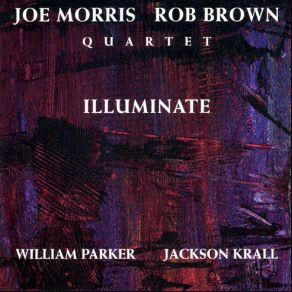Illuminate
Download links and information about Illuminate by Joe Morris, Rob Brown. This album was released in 1993 and it belongs to Jazz, Avant Garde Jazz genres. It contains 4 tracks with total duration of 53:23 minutes.

|
|
|---|---|
| Artist: | Joe Morris, Rob Brown |
| Release date: | 1993 |
| Genre: | Jazz, Avant Garde Jazz |
| Tracks: | 4 |
| Duration: | 53:23 |
| Buy it NOW at: | |
| Buy on iTunes $7.99 | |
Tracks
[Edit]| No. | Title | Length |
|---|---|---|
| 1. | Results | 11:54 |
| 2. | Illuminate | 7:12 |
| 3. | Inklings | 23:04 |
| 4. | Pivotal | 11:13 |
Details
[Edit]This quartet date pairing alto saxophonist Rob Brown with guitar madman Joe Morris dates from 1993 with William Parker, the ubiquitous New York bassist in the avant-garde, and the lesser-known, but very able drummer Jackson Krall. Recorded by Tommy Tedesco (not the guitarist), this set has all the elements that many of Morris' other dates are missing: cohesiveness. Here he is merely part of the band. Sure, he solos, but no more or less than Brown. Rhythmically, the fit between Parker and Krall is an unusual one. It's not so much about who's leading who but who's studying who. There is a stop and go relationship here that might, in another setting, be a drawback, but with two strong soloists it works perfectly well. The first track is a group improvisation that gets itself out to the edge, but before it does it has a hard-swinging run at bebop and jazz-rock. It's the closest either Parker or Morris has come to such a thing in memory. There's plenty of soloing for everybody, which gets to be a bit much after awhile, but the group playing is stellar, and Brown's own break is a highlight. On Morris' "Illuminate," which opens like "Green Dolphin Street" and moves into a slow blues wail, then a ballad in which Brown quotes everything from "All the Things You Are" to "Softly As in a Morning Sunrise," and Morris, in true snaky form, meanders all around the melody trying to find a new place for it within the context of the band. You have to wonder why he does things like this with his own modes and melodies. He's hesitant and precise, but the pauses are too long to keep the continuity of this very moving and beautiful tune from being broken. Brown's "Inklings" is the finest piece of music on the record, as well as the longest — even if it does start out with a rhythm section duet. Here, Brown and Morris use the notion of ascending development to create the space for improvisation. They halt just enough to bring the other instruments in and then introduce another idea. Brown plays economically. Each note counts because he's in no particular hurry to get anywhere. He has a solid band supporting him and the ideas come freely and quietly until the right moment. The measure comes at about two-and-a-half minutes in, and he and Morris, matching line for line, not for fractured note, erupt into a volcano of sonic ribbons. They go back and forth like this for long periods until the playing turns itself inside out and swings like old-school jazz — as interpreted by Ellery Eskelin, not Don Byas. Morris and Parker use their strings to fluctuate the tempo back and forth while Krall triple-times the entire band until they virtually collapse at the tune's end. Some of the most enduring things are the flaws; they are worn proudly, as moments frozen on tape in the heat of group interplay. It's worth owning for this alone, but it's also a challenging and deeply satisfying set of music by a short-lived but gifted quartet.